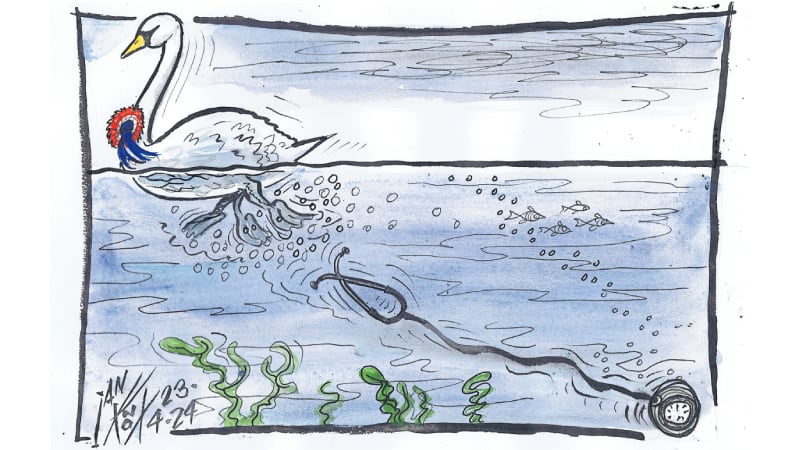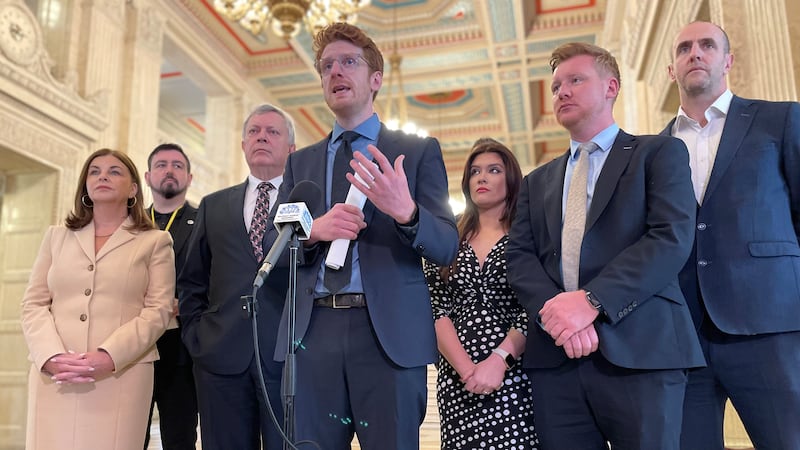In last year’s election cycles, Sinn Féin ran a campaign based on “equality, respect and integrity”, called for the “implementation of previous agreements” and promised “no return to the status quo”. The rhetoric was enthusiastically endorsed by almost 225,000 voters. In the negotiations that followed, it proved to be just that – rhetoric.
February’s so-called ‘draft deal’ revealed that Sinn Féin were in fact willing to accept the status quo plus an Irish language act. That is, they were happy to re-enter the executive without reform of the controversial petition of concern, despite clear commitments made by parties to do so in the Stormont House and Fresh Start agreements.
The petition of concern was designed as part of the Good Friday Agreement with a view to protecting minority, requiring ‘cross-community support’ on key decisions. Since then, it has been repeatedly abused to protect party political interests, deny human rights and to derail ‘bread and butter’ politics. The DUP infamously used the instrument to block marriage equality while Sinn Féin tried (and failed) to enact a petition against legislation preventing individuals with serious convictions from becoming highly-paid special advisers at Stormont.
A return to the executive under the pretences of February’s accommodation would have brought more of the same. The DUP could easily find signatures in the assembly to veto marriage equality again. It’s even more likely that the mechanism would be utilised to thwart any prospective change to our cruel and archaic abortion laws.
The conversation around the pace of social change is not unique to Northern Ireland. The topic has sparked colourful debate in parliaments around the world. Yet, only our institutions have been unable to withstand the debate – and it is only in Northern Ireland that these issues are allowed to be sheltered from standard democratic processes. Rectifying the petition of concern could be central to breaking our ongoing political deadlock and finally delivering a sustainable devolved government. A fresh round of talks focused on adapting the notorious instrument – chaired by an independent mediator and inclusive of all parties – could lead to an outcome which respects the parties’ differing views on substantive social and cultural issues, whilst opening the door for progress on these matters in a restored assembly.
Back in 2016, the Alliance Party made petition of concern reform a precondition for participating in government, stipulating that its use must be restricted to the core areas for which it was intended. These calls for change fell on deaf ears, flatly rejected by both Sinn Féin and the DUP, who proceeded to enter into a dysfunctional and predictably ill-fated executive on their own.
There is no cogent argument for the petition of concern’s continued applicability to areas with no relevance to our past or societal divisions. If Sinn Féin are serious about rights and equality, they must prioritise petition of concern reform in any future talks.
EOIN TENNYSON
Portadown, Co Armagh
Cyclists behaving badly are giving decent ones a bad name
I agree with much of what John Kelly (August 9) says in respect of cyclists having a duty of care to others, as well as themselves, but there are some inaccuracies within his letter that I would like to clear up. Mr Kelly stated that cyclists should not be using footpaths, and I totally agree with this.
Cyclists should be on the road and they should obey all the rules of the road when using it. Any cyclist who jumps red lights, mounts footpaths as a short cut or basically ignores the rules of the road is not a cyclist at all. Seeing such ignorance irks motorists, and rightly so, but it also irks genuine, law abiding cyclists who eventually bear the brunt of such ignorance by other cyclists, as motorists seem to have a thing for tarring all cyclists with the one brush.
Mr Kelly also mentioned road tax, something that motorists often throw at cyclists to try to justify their opinion that they have more right to be on the road. The fact is, road tax does not exist. Road tax was abolished in 1937 and replaced by Vehicle Excise Duty (VED). The monies raised via VED go directly into the treasury and notvon roads, as the monies from road tax would have, so this argument is null and void. Also, I would imagine a large percentage of cyclists are car owners, so they will be paying the same VED as other motorists.
Mr Kelly also mentioned cyclists and insurance. From my experience, any cyclist who is a member of a cycling club will have compulsory insurance through Cycling Ireland. I’m sure many others, who are not part of a cycling club, will have their own personal insurance to cover them.
Mr Kelly’s views on hi-vis clothing and helmets being made compulsory, I wouldn’t argue against but I think it should be common sense for any cyclist to make sure that they are wearing appropriate clothing and also that a helmet is a must for all journeys.
There are definitely cyclists out there who give the decent ones a bad name, but motorists have a lot to answer for when it comes to cyclists on the road. Some motorists just don’t want a cyclist on the road. But the fact is, we have as much right to be there as any other vehicle, and as long as the rules of the road are obeyed, then the respect that motorists receive should be reciprocated.
WILLIAM DUNNE
Belfast BT11
Doubts about united Ireland
In September 1960 I went to Croke Park with a couple of lads who were neighbours of my aunt who lived in Dublin. I was 15 and desperate for a ticket for the Down v Kerry final.
These lads had the answer and as tickets were like hen’s teeth up here it was a no-brainer to go and stay with the aunt. The match and the result were brilliant but, my abiding memory is of the greeting from the lads on that Sunday morning ‘How are things in the wee black north’. Sure I thought ‘I’m not from the wee black north’ but said nothing seeing as I was their guest for the day. Years later I realised that down there they don’t really differentiate between the ‘northern tribes’. We’re all ‘wee black northerners’.
This brings me to a casual observation from my wife during a border poll discussion on radio. ‘Would a referendum in the south to see if they would want us, should we happen to vote for a united Ireland, not be a good idea as a first step’? And you know she was right. I presume that we can’t force ourselves on the south and, despite the rantings of Mary Lou, it’s far from clear that she speaks for the majority of southerners on this issue.
Myself and many of my acquaintances who were formerly in favour of an agreed united Ireland would, not now, have any wish to be associated with a nation who by recent referendum abandoned their traditional respect and nurture of the unborn child.
KIERAN McMULLAN
Randalstown, Co Antrim
Taoiseach is no friend of northern nationalists
Anyone who thought Leo Veradkar was a friend of northern nationalists should have read Brian Feeney’s excellent article (July 11). He points out the uselessness of our prize possession the Irish passport. The EU didn’t like the idea of us in Northern Ireland getting any perks when we leave and the taoiseach did not fight our corner.
Many of us got British passports a long time ago just because they were cheaper. After the referendum there was a wild panic to obtain the Irish passport. A bit like the Klondyke, gold rush.
When Brexit is fully implemented we in Northern Ireland will have no rights whatsoever compared to our friends over the border.
TJ CARRAGHER
Cullyhanna, Co Armagh







